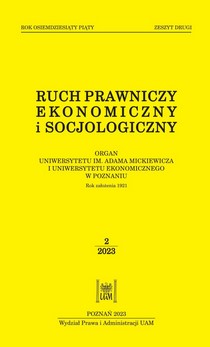VALUES IN ZYGMUNT ZIEMBIŃSKI’S THEORY OF LEGAL INTERPRETATION: SOURCES
VALUES IN ZYGMUNT ZIEMBIŃSKI’S THEORY OF LEGAL INTERPRETATION: SOURCES
Author(s): Marzena KordelaSubject(s): History of Law, Post-War period (1950 - 1989), Philosophy of Law
Published by: Uniwersytet Adama Mickiewicza
Keywords: law interpretation; values; axiologically rational legislator;
Summary/Abstract: The early phase of Zygmunt Ziembiński’s theory of law interpretation was developed between the late 1950s and early 1970s. From the very outset, values would feature permanently in the theory as components of the axiological system of the legislator. Certain values, such as legal certainty and the correspondence between law and social life, became central to two interpretations: static and dynamic interpretation, respectively. Ziembiński was the first Polish legal theorist to define functional interpretation as a paradigm that invokes the legislator’s values. As he argued, two types of functional interpretation: analogia legis or extensive interpretation have their effect anchored in the adopted values, thus preventing cases which happen to be strongly justified axiologically by such values from being excluded from regulation. Values also enable identification of the norms-conclusions derived through analogia juris and argumenta a fortiori. By providing grounds for the postulation of the rule of law, values ultimately safeguard the legal system from abuse.
Journal: Ruch Prawniczy, Ekonomiczny i Socjologiczny
- Issue Year: 85/2023
- Issue No: 2
- Page Range: 63-72
- Page Count: 10
- Language: English

